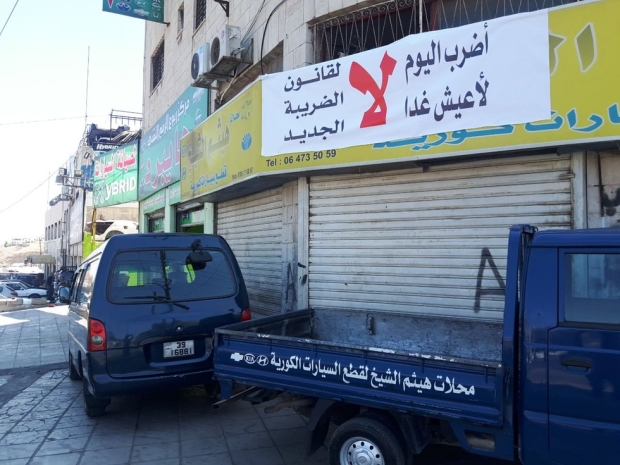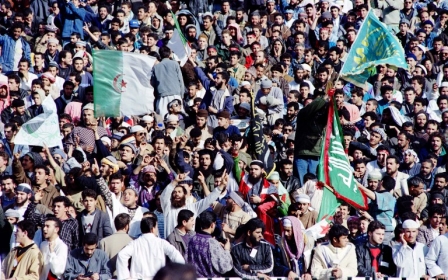Jordanians strike against tax rises in largest protest for years

Thousands of Jordanians went on strike in Amman on Wednesday to protest against a proposed law that would see a major increase in taxes that will hit them hard at a time when they are already struggling.
The protest, one of the largest demonstrations in recent years, saw a wide range of professionals, from doctors to journalists to bankers, demand the withdrawal of the income tax law proposed earlier this month.
'The middle class in Jordan is suffering, and with this law the financial situation will be harsher. Even the poor class is expected to pay more tax'
- Ashraf al-Karaki, dentist
The law - which follows a key condition of a three-year IMF economic programme to bring down public debt - would significantly lower the income tax threshold. Banks and industrial firms would be forced to pay taxes at a time when economic growth has been stagnant and businesses have complained of shrinking consumer demand.
Dr Ashraf al-Karaki, a dentist in Amman who participated in the strike, told Middle East Eye that the law will severely impact the everyday lives of Jordanians.
"The middle class in Jordan is suffering, and with this law, the financial situation will be harsher. Even the poor class is expected to pay more tax," Karaki said.
In the past, most Jordanian protests have been organised by political parties, but Wednesday's demonstrations included the participation of 33 associations, including a wide range of unions and professional syndicates - and spread beyond the capital to Madaba and Aqaba.
Most shops and businesses were shut downtown, according to eyewitnesses.
Central markets did not receive the usual fruit and vegetable deliveries, and butchers and supermarkets were not supplied with fresh meat and poultry, as farmers and food catering traders joined the strike.
Final exams were still administered despite the participation of the 140,000-strong Teachers Association, whose members joined pharmacists, garment traders and contractors among others.
"Today, all the people joined the strike from different social backgrounds. The majority are apolitical people," said Karaki.
'I strike today to live tomorrow'
The government has argued that proposed reforms will reduce social disparities by progressively taxing high earners while leaving low-paid public sector employees largely untouched.
But Taghreed al-Dughmi, a lawyer and member of the Jordan Bar Association who participated in the strike, told MEE that major concerns remain over the proposed law.
'It sets an imprisonment sentence of three to 10 years on whoever fails to pay his taxes. The majority of Jordanian people would end up in jail'
- Taghreed al-Dughmi, lawyer
"The current law gives tax allowance up to 12,000 Jordanian dinars, but the new draft reduces the allowance to 8,000 JDs. It also states that anyone above 18 years old must submit tax, which the current law does not," Dughmi said.
Pensions and inheritance would also be taxed for the first time, and income taxes for banks and insurance companies will increase by 40 percent, a cost that she said will be passed on to customers.
"The striking thing about this draft law is that it sets an imprisonment sentence of three to 10 years on whomever fails to pay his taxes," she added. "This means that the majority of Jordanian people would end up in jail."
Protesters chanted slogans that echoed those from the Arab uprisings in 2011, such as "the people want the fall of the government" and "I strike today to live tomorrow" - a central message carried on posters, banners and cardboards.
Protesters also chanted folklore songs after injecting them with political messages like this one that depicted the government as "a bunch of thieves":
Jordanians shared a meme online which showed a cartoon of Prime MInister Hani al-Mulki saying "We could not fight poverty, so we will fight poor people."
Dughmi said that a committee of lawyers has been formed to provide free legal assistance to employees whose bosses threatened to fire them for taking part in the strike."We received several complaints about the threat of being sacked from employees who work mainly in the public sector that is funded by the government," Dughmi said.
Striking in Jordan, she said, is a right guaranteed under the kingdom's labour laws.
Jordanian local media shared footage of Greater Amman Municipality employees defacing the strike's posters that had been spread on the shutters of shops and business in the capital.
"The government's draft version of the income tax law is not binding for the parliament, which will deal with the draft law in a way that meets citizens' needs and serves their interests,” Tarawneh said.
Jordan has faced internal and external challenges in recent years, with unemployment and crime on the rise. It has largely managed to keep clear of the regional turmoil witnessed since 2011, with wars raging in neighbouring Syria and Iraq.
Karaki acknowledged the challenges but questioned why the government has so far failed to come up with a sustainable economic policy.
"The only policy and solution they found is a new income tax. People felt despair and lost the trust in the Jordanian parliament and the government. That's why everybody put their faith in the associations," Karaki said.
- Additional reporting from Reuters
This article is available in French on Middle East Eye French edition.
Middle East Eye propose une couverture et une analyse indépendantes et incomparables du Moyen-Orient, de l’Afrique du Nord et d’autres régions du monde. Pour en savoir plus sur la reprise de ce contenu et les frais qui s’appliquent, veuillez remplir ce formulaire [en anglais]. Pour en savoir plus sur MEE, cliquez ici [en anglais].








